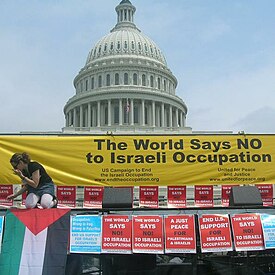Palestine lobby in the United States
This article may lack focus or may be about more than one topic. (May 2022) |
The Palestine lobby in the United States is organized by a number of pro-Palestinian advocacy groups seeking to influence the United States government, institutions, and citizens to actively oppose Israel's occupation of the Palestinian territories, many of them members or cooperating with the U.S. Campaign for Palestinian Rights.[1] These organizations include peace and anti-war, human rights, anti-Zionist, and Arab- and Muslim-American groups.[2] Groups against occupation also include Jewish Voices for Peace[1][3] and Students for Justice in Palestine,[1] among others. Their tactics include education, protest, civil disobedience and lobbying.[4][5][6][7]


History
Political activism against occupation first emerged in the wake of the Six-Day War when Israel conquered the West Bank, Gaza and the Golan Heights from Jordan, Egypt, and Syria.[8] In general, the Israel lobby in the United States is significantly stronger than the Palestine lobby and enjoys bipartisan support on the federal level, especially in the wake of the 2023 Hamas-led attack on Israel.[9] As a result, pro-Palestinian organizations have focused more on grassroots organization, influencing elected officials in state and local levels, and cooperating with other social justice organizations.[10]
Much of the advocacy has since centered the BDS movement, which was created in 2005.[10] During the 2023 war in Gaza, pro-Palestinian groups have focused on lobbying, organizing, and protesting for a ceasefire and reducing the Gaza blockade.[9]
Critics
Michael Lewis, director of Policy Analysis for the American Israel Public Affairs Committee criticizes a number of anti-occupation groups, contending that their goals are "to drive a wedge between the U.S. government and Israel; to undermine public and government support for Israel in the United States, and (especially since the 1973 war) to bring about a halt in American governmental aid to Israel."[11]
In his book In the Trenches: Selected Speeches and Writings of an American Jewish Activist, David A. Harris, executive director of the American Jewish Committee says Israel must explain "how the occupation came about" and dismisses as "buzzwords" Palestinians attempts to gain sympathy as an occupied people.[12]
See also
References
- ^ a b c Oxnevad, Ian (2023). The Company They Keep: Organizational and Economic Dynamics of the BDS Movement (PDF). National Association of Scholars. pp. 17–18, 109–110.
- ^ Member Organizations Archived 2016-08-23 at the Wayback Machine US Campaign to End the Israeli Occupation (now the US Campaign for Palestinian Rights).
- ^ "A JEWISH VOICE FOR PEACE INC - GuideStar Profile". www.guidestar.org. Retrieved 2023-12-30.
- ^ 40 National Orgs. Tell Congress, "Freeze Military Aid to Israel Until Israel Freezes Settlements", by the US Campaign to End the Israeli Occupation in Monthly Review, June 16, 2009.
- ^ Ida Wahlstrom, Rights Groups Condemn US Role in Gaza Conflict, Common Dreams, January 10, 2009.
- ^ H. L. Krieger, US rally against Israeli 'occupation' attracts smaller numbers than expected, Jerusalem Post, June 11, 2007.
- ^ Melissa Apter, 'Coming Out' for the Palestine Solidarity Movement, The Nation, June 4, 2007.
- ^ George Friedman The Israel Lobby in U.S. Strategy, September 4, 2007.
- ^ a b Hauslohner, Abigail (2023-11-06). "In Israeli-Palestinian battle to sway Congress, only one side wins". Washington Post. ISSN 0190-8286. Retrieved 2023-12-30.
- ^ a b Hitchcock, Jennifer (2023-03-15). "Framing Palestinian Rights: A Rhetorical Frame Analysis of Vernacular Boycott, Divestment, Sanctions (BDS) Movement Discourse". Rhetoric Society Quarterly. 53 (2): 87–103. doi:10.1080/02773945.2022.2095422. ISSN 0277-3945.
- ^ Israel's American Detractors - Back Again, by Michael Lewis, Middle East Quarterly, November 1997
- ^ David A. Harris, In the Trenches: Selected Speeches and Writings of an American Jewish Activist, KTAV Publishing House, Inc., 2008, pp. 58, 282, 311.